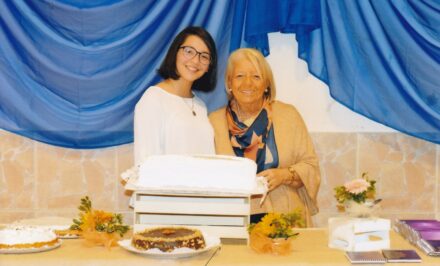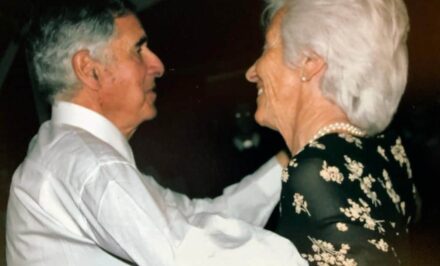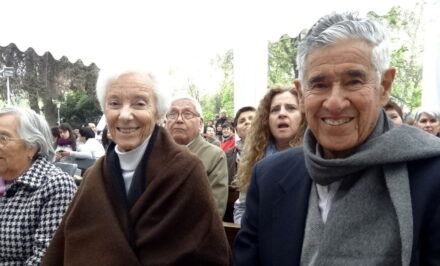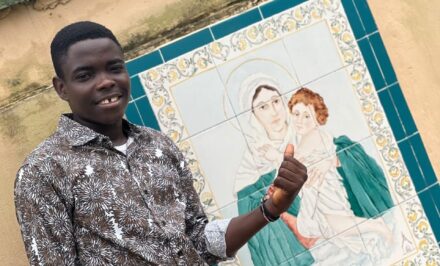 Fr Simon Donnelly. An old pioneer struck camp this week; he hung up his missionary shoes, and closed his eyes for the last time on all the people he had been sent to. These lines are based on some hours spent with Fr Weikamp in July 2008.
Fr Simon Donnelly. An old pioneer struck camp this week; he hung up his missionary shoes, and closed his eyes for the last time on all the people he had been sent to. These lines are based on some hours spent with Fr Weikamp in July 2008.

“I am Father Johannes Andreas Weiskamp. I was born on 29 November 1926, in Bocholt, near the Dutch border. My parents named me Johannes, but I was born on 29 November, the eve of the feast of the Apostle Andrew, so they added Andreas (Andrew). I had 5 brothers and 5 sisters. But two I did not know, because one died at birth, and my mother at seven months into her pregnancy with another fell, and the child died young.
“In March 1939, my mother who had already been diagnosed with stomach cancer learned that I would indeed be able to go to the Mittlere Reife (Middle School), by skipping to a class higher – This was so… interesting“, he searches for the right adjective, “…so wonderful!… My mother died the following day. I was 12 years old.
“Somehow, although I was scheduled to be called up as a soldier during the war, it never happened. The medical examiner pronounced me not fit enough to serve. Interesting…!
“Towards the end of the war, around Christmas 1944, our youth chaplain in Bocholt died. We buried him, and some months later in 1945 we received a new chaplain, a Schönstatt Bundespriester (Union priest), called Fr Stroth. He said to me bluntly: “What are you going to do after Mittlere Reife?” I was going to be able to graduate with a Kriegsabitur (“war matriculation”), but which would not be sufficient to study at a Hochschule (University). “Do you want to study further?” asked Fr Stroth. “Yes, I said…” He said: “Go to Bonnhofen, and speak to the fathers there. They are starting a new novitiate at Limburg. I will give you a note”. Which he did. And a few days later I was studying at Limburg! So interesting, so wonderful!
Fr Weikamp interrupts himself, half-smiling, emphasing what he is saying: “Interesting! Wonderful!” He is at a loss for words. Sometimes the memories come running out, one after the other. At other times, they are stuck together; he struggles to separate the events and the people. I prod gently with a date or a person. “No no!…” He is searching for the just the right phrase, the right person’s name, the right year when something happened. He is completely taken up in the memory of the graces that have been given him in the story of his life. It seems right that we should be overwhelmed by these graces which Almighty God has poured into our hearts, by the grace offered to us through the bidding of Mary, Mother of God, our queen and our mother.
The young priest beams in picture after picture, radiant, full of the grace of his ordination
 He points me to open a drawer at the bottom of his cupboard: I take out the photo albums he points to. I turn the pages of the first album, and see shining black-and-white photos of a young seminarian, a beaming young man, radiating happiness in every picture. . On 27 July 1952, this young man was ordained at the Pallottine Church in Schoenstatt, here in Vallendar, with eight others. In a few days [as of this 2008 conversation], that will be fifty-six years ago. The youngest in the group-looking but a schoolboy-was one Fr Johannes Weikamp. When the bishop came to lay hands on this young man from Bocholt, Fr Weikamp says the bishop hesitated, saying to his secretary: “Is he 25?” (the canonically minimum age to be ordained). The gestured answer was ‘yes’, and the ordination could go on. Immediately afterwards, the bishop said to the young new priest: “How old are you?” The pictures show a smiling new priest who could be a mere 17 years old, just a broth of a boy… From Fr Weikamp’s face now, half a century later, I see that his ordination day is as fresh as yesterday. The photos show the young priest at his first Mass in his home parish, then later in Schoenstatt. Then sitting in an open car, accompanied by the priest who had seen the beginnings of the young vocation. The meal at the family home, surrounded by relatives. Beaming! The young priest beams in picture after picture, radiant, full of the grace of his ordination.
He points me to open a drawer at the bottom of his cupboard: I take out the photo albums he points to. I turn the pages of the first album, and see shining black-and-white photos of a young seminarian, a beaming young man, radiating happiness in every picture. . On 27 July 1952, this young man was ordained at the Pallottine Church in Schoenstatt, here in Vallendar, with eight others. In a few days [as of this 2008 conversation], that will be fifty-six years ago. The youngest in the group-looking but a schoolboy-was one Fr Johannes Weikamp. When the bishop came to lay hands on this young man from Bocholt, Fr Weikamp says the bishop hesitated, saying to his secretary: “Is he 25?” (the canonically minimum age to be ordained). The gestured answer was ‘yes’, and the ordination could go on. Immediately afterwards, the bishop said to the young new priest: “How old are you?” The pictures show a smiling new priest who could be a mere 17 years old, just a broth of a boy… From Fr Weikamp’s face now, half a century later, I see that his ordination day is as fresh as yesterday. The photos show the young priest at his first Mass in his home parish, then later in Schoenstatt. Then sitting in an open car, accompanied by the priest who had seen the beginnings of the young vocation. The meal at the family home, surrounded by relatives. Beaming! The young priest beams in picture after picture, radiant, full of the grace of his ordination.
South Africa
The next year the young priest was sent to by ship to South Africa (the Union of South Africa, as the uneasily united Dutch-English colony still was). The Schoenstatt sisters had been there nearly twenty years already. They had laid the first seeds, with the Pallottine fathers, for everything that would follow.
Then comes a small heap of unsorted and undated photos of Fr Weikamp growing into his 30s and his 40s, in black-and-white pictures with young black sisters and young white sisters in South Africa, with African people on the mission stations and farms where he would spend the next nineteen years of his life. These two decades spanned the very peak of politically legalised apartheid. At the very time when the state wanted black people and white people to be completely separate, the white Fr Weikamp – and many others – were planting the seeds of the future of our Church among the black citizens of the new political and religious society that would take over long after Fr Weikamp would leave South Africa. It is well-known to the Schoenstatt fathers, and to others who know Fr Weikamp, that South Africa is the country where his heart went, and perhaps stayed. Surely when Jesus sat at the table with his Apostles-“I have called you friends”, he thought of those he loved in the world-the Pharisees and Saducees and the Roman centurion, and the children, and the Samaritan woman, and Lazarus, and Mary and Martha, and and all who he would be torn away from in earthly death. And he grieved to leave them. He was sent to them, and yet he had to leave them behind. These are part of the treasured graces of an old priest, part of his cross, too.
I was so happy there
“I was so happy there”, says Fr Weikamp, his face shining with happiness at his memories. “I didn’t have much, but I was happy with my people. I had everything I needed”. The phrase is telling: ‘my people’. I mention to him the names of a few Schoenstatt sisters I knew only as already very elderly sisters in the 1970s, when I was a young boy. Like Sr Edwina, the ‘garden sister’, first in the eastern Cape, then in Villa Maria in Cape Town. Did you know her? “Of course…!”
There is so much from this time in South Africa that is stored up his heart, so very much, that there are few coherent photos in his albums. And Fr Weikamp doesn’t talk much about this time. I don’t ask many questions, because it is clear that his memories are precious, and sometimes memories are so precious, so tied up with the people one has known and loved – and perhaps lost – that it is difficult, even painful, to recall them. These memories are hidden from the world, from all excepting the Author of Life, who is the author of even our most private self. Fr Weikamp could have tried to describe these memories, but no one else was there, least alone I, who was not yet born for most of them. All the faces, all the smells and tastes, all the sufferings and joys of the flock that was his to tend to for two decades, all that is stored in his heart. Surely all these memories are part of the offering each priest makes to the Father, each day in Holy Mass, on the paten, and in the sacrificial offering of his whole priestly life.
There was so much to do on the farms, and on the missions, that there wasn’t really time to document these thousands of Masses, tens of thousands of hours spent celebrating the sacraments of the Church: so many hours in the confessional, so many times baptising the young and the converted, so many times witnessing the joining of men and women in marriage, and so many sacramental visits to the sick, and to the very sick, helping them prepare for death.
And so many other Schoenstatt and Pallottine fathers have done the same in other countries, in South America and elsewhere. Who will tell the story of each man’s pastoral life, of his priestly ministry, and of each of the lives of each of the faithful, in all corners of the Church? Only the Author of Life knows the whole of each human life. These dead priests, and the aging missionaries who live on, are the living incense of the Church: as our prayers have risen to God through their priesthood, so these men’s lives are slowly burnt up, they are consumed, offered up to the Father in the heavenly sanctuary, joined to the one sacrifice of the crucified and risen Son of God.
The last photo album
There are other photos of the time afterwards, the years when Fr Weikamp came back to Germany. In the course of a few pages, he grows older, suddenly much older. And some of the pictures show his friends and mentors who have gone before him: many pictures of Fr Monnerjahn and Fr Plein, first the one growing sick, then suddenly the other. I saw in these photographs Fr Plein grow gaunt, lying in sick bed, then at last lying in his final earthly bed, with the icon of the MTA next to him, candles burning, dressed in his priestly vestments, waiting for the Last Day. At that picture, Fr Weikamp has no words, only quiet grief at the memory of his friend and father who has gone ahead of him. We slowly turn the pages.
The last photo album we find is a small one. It is the course book of Fr Weikamp and his course brothers, containing a record of their meetings and their resolutions from 1945 onwards. At the start there are nearly twenty signatures. He goes over each one, thinking aloud. “No, he is dead… He is dead too. He is still alive…! We still meet when we can.” Just five are still alive. The Father has called each dead course brother home in his turn. The Father has called each dead course brother home in his turn. We too have a day and an hour that we do not know. And on that day, all the prayers we have ever prayed, all the prayers of those who have ever prayed for us, they all matter. Everything matters. “Allen alles sein”, said Fr Kentenich: “Being everything for everyone”: this is our Christian mission.
These wonderful graces in Fr. Weikamp’s life
All these… interesting, even more, these wonderful graces in Fr Weikamp’s life. Our queenly mother is admirable, even more, she is three times admirable, three times wonderful. The Father chose her in time to bear the Word. So… wonderful! He sent his Spirit upon her… again, wonderful! And in the fullness of time, she bore his only Son, monógenos… no other words for this than Wonderful! The triple-graced mother is truly kexaritoméne -filled with grace. And from her priest Son, each priest in the Church -each alter Christus– receives his priesthood.
When I see in the eyes of an old priest in the evening of his life this wonder at all that he has experienced and received, I see a priestly life offered wholly to the Theotokos, each day renewed in his complete offering of self to the Mother of God, keeping a covenant first made with her more than fifty summers and fifty winters before. This is the living out of “I give myself entirely to you…”
May each seminarian receive the grace to reach the altar of God, to lie one day with his face flat on the earth to be anointed into the priesthood of Melchizedek, the kingship of David, the prophetic vocation of Isaiah and Jeremiah and Ezekiel, the more fully to share the priesthood of the Christ, the Anointed One of God. May every priest be faithful to his vocation, impossible but for the healing and transforming graces of God poured into the whole of our being by the perfect vessel, our Queen, mediatrix of all graces, she who will lead us and help us and show us her Son. Mater Tres Admirabilis, clarifica te!
Rest in peace
A few days ago, on Saturday 26 June 2010, Fr Weikamp turned away from the Schoenstatt province house for the last time, and set his feet on the road past Mount Moriah, even past Limburg, the road that leads from earth towards the gate of heaven and the day of the Just Judge. Everything is now handed back to the Father, from whom everything came: life, hopes, fears, people prayed for, people grieved over, people given thanks for, and above all the 58 years of Fr Weikamp’s priesthood.
The last thing I remember Fr Weikamp saying to me in July 2008: “Please especially give greetings to Sr Mary Hastings, in Constantia, Cape Town”. She herself died in February this year. Now, these old friends – we believe in faith – can greet each other in person, in the waiting room of heaven. Now is the hour of his death. Now the Blessed Mother has revealed herself. Now and the hour of our death. Rest in peace, priest of God.













